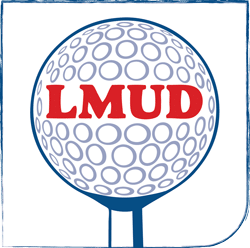Conservation with Reuse: Presentation

On February 13, 2020, Lakeway MUD (LMUD) was invited to present to fellow water professionals at the Central Texas Water Conservation Symposium held in Austin, TX. Organized by Central Texas Water Efficiency Network (CTWEN), this reputable annual event brings together state and national experts to discuss water conservation planning. Invited attendees included representatives from cities and regional water authorities, water conservation planners, water system engineers, and other business and community leaders, consultants, and advocates.
LMUD is recognized as an innovator in recycled water programs, being one of the first in the state of Texas to implement a water reuse system in 1975. LMUD went on to make history in 1994 by becoming the first water provider in Texas to utilize a water reuse system in a residential area: Estates of Lakeway Hills. As community interest for this drought-resistant water supply grows, the LMUD management team continues the effort to be on the forefront of system expansion and Texas Commission on Environmental Quality (TCEQ) permitting efforts.
LMUD is recognized as an innovator in recycled water programs, being one of the first in the state of Texas to implement a water reuse system in 1975.
Christianne Castleberry, LMUD’s engineer consultant, participated in a panel session at the Symposium on the topic of “Reuse as a Resource” alongside representatives from City of Austin and U.S. Bureau of Reclamation. Castleberry’s topic of “Conservation with Reuse” focused on the history and growth of LMUD’s water reuse system resulting in its present advanced state which saves approximately 30 percent of LMUD’s potable (drinking) water from being used as irrigation.
“LMUD is saving roughly 158 million gallons per year from being taken out of Lake Travis,” she said. This is a worthy achievement since the Lake is the only source of raw water for the area and serves as a key recreational asset that local businesses depend on to bring in revenue. “LMUD serves as a great example to utilities having less advanced water reuse systems for what can be achieved with time and dedication to beneficial use of recycled water for conservation of freshwater drinking water supplies,” she added.

The Highland Lakes, including Lake Travis, are susceptible to drought so minimizing how much water is withdrawn is an important conservation effort. Castleberry made note that in response to the severest drought on record for the Highland Lakes, Earl Foster, General Manager of LMUD, spearheaded the formation of the Highland Lakes Firm Water Cooperative in 2012. This coop advocates for firm water interests within water management planning efforts to ensure enough water is allocated for potable water use, especially in times of drought.
The Highland Lakes discharge ban rule, passed by TCEQ in the late 1980s, prohibits affected water utilities from discharging treated wastewater back into the Lakes, making land application the only option for LMUD’s effluent disposal. When interest in recycled water was low, LMUD had to dispose of this effluent on cedar tracts that they own for this purpose. “Cedar trees are used for excess disposal because of their high evapotranspiration rate,” Castleberry stated.
Under TCEQ Chapter 210 Authorization, LMUD rigorously tests and treats recycled water to the highest standard, known as “Type I reclaimed water”, which is proven to be safe and environmentally friendly. LMUD’s irrigation with recycled water began in 1975 with the Live Oak and Yaupon Golf Courses, covering 245 acres. Application areas expanded in early 2000s to the 11 acres of Lakeway Boulevard median. Over the years, it has expanded to the be beneficially used for widespread irrigation of city parks, commercial properties, and residential associations, diminishing the need for disposal on cedar tracts.
LMUD rigorously tests and treats recycled water to the highest standard, known as “Type I reclaimed water”, which is proven to be safe and environmentally friendly.
“Due to permit requirements, LMUD maintained a particularly large piece of property for effluent disposal in the middle of Lakeway. Because the land was not being used for irrigation due to the high demand for recycled water in other areas of the city, the unused cedar tract became a fire hazard,” Castleberry said. In 2015, LMUD amended their Texas Land Application Permit (TLAP) to take “credit” for much of this “Chapter 210 Beneficial Reuse”, allowing the unused cedar tract land area to be relieved from the permit. The 80-acre tract is currently under contract by a developer, ultimately relieving LMUD of the costs for maintaining the land and thereby benefitting LMUD’s customers. LMUD continues to own 53 acres of cedar tract, in which 23 acres are required by permit for use in wet years.
Expansion of the LMUD water reuse system wasn’t always easy. Public perception was a key deterrent for the expansion of the water reuse system, even into the early 2000s. Castleberry recalled a story of challenges to an early 2000 land application permitting effort when the permit was contested. Fast forward to 20 years later, the Lakeway community’s gradual acceptance and increased reliance on use of this Type I reclaimed water for irrigation has now developed into a community that fully embraces the benefits of irrigation with recycled water and is proud to tout the resulting significant savings of valuable Lake Travis freshwater supplies for public consumption.
The LMUD water reuse system is currently being expanded even further for residential application through the Out of District Wastewater (ODWW) Project, taking advantage of opportunities to expand the system in conjunction with the expansion of the wastewater system so as to reduce overall future construction costs. More information on the ODWW Project can be found here.

 You are now being redirected to the WaterSmart page.
You are now being redirected to the WaterSmart page.